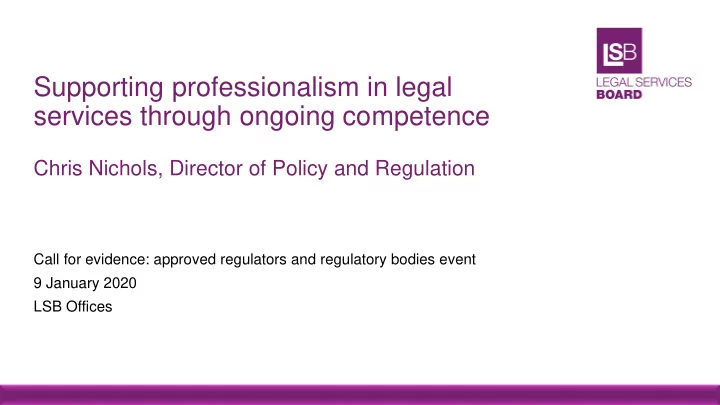

Supporting professionalism in legal services through ongoing competence Chris Nichols, Director of Policy and Regulation Call for evidence: approved regulators and regulatory bodies event 9 January 2020 LSB Offices
Our vision ▪ Legal services that everyone can access and trust ▪ Supporting the ongoing competence of professionals at the very heart of achieving this vision. ▪ Consumers must be able to trust that their legal professional has the necessary skills and experience to advise or represent them.
Words that describe the legal profession Value for money Trustworthy Self interested Respected Highly qualified Difficult to understand Knowledgable Professional Expensive 0% 10% 20% 30% 40% 50% 60% 70% 80% 90% 100% 2018 Legal Services Consumer Panel tracker survey
45% of the public trust lawyers to tell the truth – Consumer Panel 100% 90% Ipsos Mori research reports trust in 80% lawyers at 26%, compared to doctors 70% (67%) and teachers (58%) 60% 50% 40% 30% 20% 10% 0% Dcotors Teachers Lawyers Accountants Ordinary persons Car mechanics Bankers Builders Estate agents 2018 Legal Services Consumer Panel tracker survey
What do we mean by “ongoing competence?” “Combining up -to-date knowledge and skills with good client care, to deliver advice in a way that is useful” Legal Services Consumer Panel ▪ Competence is dynamic – the ▪ Looking beyond entry level law, client and regulatory competence expectations are constantly evolving
What we will be doing We want to: ▪ understand and map current competence frameworks ▪ both within and beyond the legal services sector ▪ build consensus around what works best ▪ with a view to setting standards and expectations around ongoing competence in the legal services sector. We want to hear from a wide range of people about their experiences, ideas, and any evidence of where risks may be materialising.
Call for evidence Focuses on gathering evidence across four central themes: 1. Defining competence and competence assurance 2. Consumer expectations of competence 3. Competence assurance in the legal services sector 4. Competence assurance in other sectors
1. Defining competence and competence assurance Our early findings: ▪ There is no single, agreed definition of competence ▪ There are high level definitions (e.g. LSCP) and more detailed articulations (e.g. SRA and BSB statements of competence) ▪ There is a wide spectrum of potential tools for seeking assurance of competence. For example: Research and evidence of the impact of these tools has led some other professions to develop new methods of assurance
2. Consumer expectations of competence Our early findings: ▪ Consumers find it difficult to assess the quality of legal services, particularly in terms of technical quality ▪ Consumers assume practitioners are competent and that there are checks in place to assure this ▪ Consumers have mixed confidence in legal practitioners compared with other professions
3. Competence assurance in the legal services sector ▪ Regulators tend to focus on assuring competence on entry to the profession with less attention paid to post-qualification competence ▪ Competence may be tested in limited circumstances throughout a practitioner’s career e.g. to gain a higher rights of audience (HRA) certification ▪ Some parts of the profession have developed their own quality assurance frameworks - e.g. CPS and consumer feedback-based appraisal models ▪ There is some evidence of practitioners not maintaining competence or acting beyond it - e.g. criminal advocacy; land registry requisitions; will writing
4. Competence assurance in other sectors What approaches can we learn from? e.g. Engineers e.g. Teachers e.g. Doctors Spectrum of approach
Questions for discussion 1. What characteristics or skills should be part of any competence framework? 2. Higher risk areas - what types of consumers, consumer problems or legal activities are more likely to experience quality issues? 3. What currently works well to assure competence? 4. What is the role of regulators, providers and individuals to assure ongoing competence in the sector?
Next steps ▪ Publish call for evidence – January 2020 ▪ Wide engagement with regulators, the profession, representative and consumer groups and other industries ▪ Encourage input to the call for evidence ▪ Work with stakeholders to consider potential changes to policy framework ▪ Individual meetings with AR/RBs ▪ Potential consultation, depending on findings
Thank you Chris.Nichols@legalservicesboard.org.uk
Recommend
More recommend